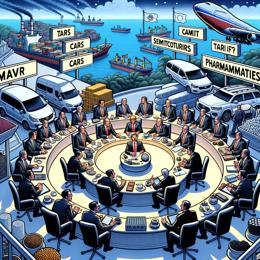Image created by AI
Reforming South Africa's Political Funding: My Vote Counts Seeks Judicial Intervention for Transparency
This week, the Western Cape High Court is set to hear a significant case that could reshape political party funding in South Africa. My Vote Counts, an advocacy group committed to enhancing accountability and transparency in political processes, is challenging the existing Political Party Funding Act (PPFA), asserting it falls short of constitutional standards.
Since the PPFA's inception four years ago, which was further amended by the Electoral Matters Amendment Act (EMAA), My Vote Counts argues the legislation fails comprehensively to address transparency, leaving loopholes that allow undue influence and corruption to permeate South Africa's political landscape.
Central to the case is the contention that the current laws allow anonymous donations below R100,000, ignore aggregate contributions from connected sources, exempt natural persons from disclosure requirements, and permit individual donations up to a staggering R15 million annually. These gaps, My Vote Counts argues, obscure the sources of political funding, allowing wealthy elites to disproportionately shape political dynamics without public scrutiny.
The advocacy group is seeking a court order to enforce total disclosure of all political donations and the implementation of stricter caps on the maximum allowable donations. They also advocate for oversight on the cumulative donations from affiliated entities and require comprehensive expenditure disclosure from political entities.
Opponents of this proposed overhaul, including the Minister of Justice, the Minister of Home Affairs, Democratic Alliance (DA), Action SA, and Parliament, argue that existing regulations strike a necessary balance between transparency and the protection of donor privacy. They suggest that full disclosure could deter private funding, potentially harming political pluralism.
This court case emerges amid broader discussions on the role of money in politics and its implications for democracy. The ongoing debate touches on critical issues such as voter rights, the influence of capital on policy-making, and public trust in political institutions.
As the case unfolds in Cape Town, it stands as a potential landmark in South Africa's ongoing efforts to refine its democracy, aiming to align its political funding laws with the constitutional values of openness, accountability, and transparency.










